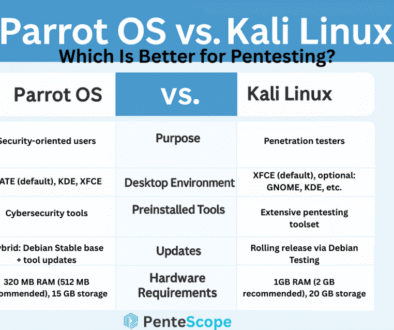Have you ever dreamed of becoming a professional penetration tester—the kind that helps organizations strengthen their cybersecurity? If so, you’re not alone. The field of penetration testing, or ethical hacking, is booming, with demand for skilled professionals to land a penetration testing job at an all-time high.
But breaking into this exciting career can feel like cracking an impenetrable firewall. Where do you start? What skills do you need? How can you stand out among numerous applicants? These questions can leave even the most enthusiastic aspiring pentester overwhelmed and uncertain.
Fear not, fellow cybersecurity enthusiast! This guide will walk you through the crucial steps to land your first penetration testing job. We’ll cover everything from identifying the right opportunities to acing the interview process, including practical assessments. By the end of this post, you’ll have a clear roadmap to launch your career in this thrilling and rewarding field.
What should I look for in a Penetration Testing job?
Key Skills and Qualifications
When looking for a penetration testing job, it’s crucial to understand the essential skills and qualifications employers seek. Here’s a breakdown of the most important aspects:
Technical Skills:
- Network protocols and security
- Operating systems (Windows, Linux, macOS)
- Web application security
- Scripting languages (Python, Bash, PowerShell)
- Common pentesting tools (Nmap, Metasploit, Burp Suite)
Certifications:
Types of Pentesting Positions
Different pentesting jobs focus on various aspects of cybersecurity. Consider which area interests you most:
| Type | Description | Key Skills |
|---|---|---|
| Web App Pentesting | Testing web applications for vulnerabilities | SQL injection, XSS, CSRF |
| Network Pentesting | Assessing network infrastructure security | Firewall bypassing, pivoting |
| Wireless Pentesting | Evaluating wireless network security | Wi-Fi cracking, rogue AP detection |
| Mobile App Pentesting | Testing mobile applications for vulnerabilities | Android/iOS security, API testing |
| Social Engineering | Assessing human-based vulnerabilities | Phishing, pretexting, physical security |
Company Culture and Growth Opportunities
Look for companies that:
- Offer mentorship programs
- Provide ongoing training and certification support
- Encourage participation in conferences and bug bounty programs
- Have a clear career progression path
By focusing on these aspects, you’ll be better equipped to find a pentesting job that aligns with your skills and career goals. Remember, entry-level positions may require less experience, but demonstrating a strong foundation in these areas will significantly improve your chances of landing your first penetration testing job.
Should I work with a technical recruiter?
Pros of Working with a Technical Recruiter
Working with a technical recruiter can offer several advantages for aspiring penetration testers:
- Access to Hidden Job Markets: Recruiters often have insider knowledge of unadvertised positions.
- Industry Insights: They can provide valuable information about company cultures and market trends.
- Resume Optimization: Recruiters can help tailor your resume to specific pentesting roles.
- Interview Preparation: They often offer guidance on what to expect during the interview process.
Cons of Working with a Technical Recruiter
However, there are potential drawbacks to consider:
- Limited Specialization: Not all recruiters understand the nuances of penetration testing.
- Commission-Based Model: Some may prioritize placement over fit.
- Potential for Overselling: They might exaggerate your skills to employers.
Making the Decision
Consider the following factors when deciding whether to work with a recruiter:
| Factor | Working with a Recruiter | Self-Application |
|---|---|---|
| Job Access | Broader, including hidden markets | Limited to public listings |
| Control | Less direct control | Full control over process |
| Guidance | Professional support | Self-reliant |
| Cost | No direct cost (paid by employer) | No cost |
Tips for Working with Technical Recruiters
If you decide to work with a recruiter:
- Choose recruiters specializing in cybersecurity or penetration testing.
- Be honest about your skills and experience.
- Maintain direct communication with potential employers.
- Use the recruiter as a resource, not a crutch.
Working with a technical recruiter can be beneficial, especially for those new to penetration testing. However, it’s crucial to balance this approach with direct applications and networking. Your decision should align with your career goals and comfort level in navigating the job market independently.
How can I make My Pentester resume/CV stand out?
Crafting a Standout Pentester Resume/CV
Highlight Relevant Skills and Certifications
To make your pentester resume stand out, focus on showcasing your most relevant skills and certifications. Here’s a list of essential elements to include:
- Technical skills (e.g., programming languages, networking, operating systems)
- Security tools proficiency (e.g., Metasploit, Burp Suite, Nmap)
- Relevant certifications (e.g., CEH, OSCP, CISSP)
- Hands-on experience (e.g., CTF competitions, bug bounty programs)
Showcase Your Projects and Achievements
Demonstrate your practical experience by highlighting your projects and achievements. Consider creating a table to present this information effectively:
| Project/Achievement | Description (Describe what you did/achieved) | Skills Demonstrated |
|---|---|---|
| CTF Competition | Example: I came 3rd in HackTheBox CTF | Web app pentesting, reverse engineering |
| Bug Bounty Program | Example: I discovered a critical vulnerability in the PenteScope app | Mobile app pentesting, vulnerability assessment |
| Personal Lab | Example: I set up and maintained a pentesting home lab | Network pentesting, wireless pentesting |
Tailor Your Resume to the Job Description
Customize your resume for each pentesting position you apply for. Analyze the job description and incorporate relevant keywords throughout your resume. This approach helps you pass applicant tracking systems (ATS) and demonstrates your suitability for the specific role.
What is the typical Penetration Testing Job interview process like?
Understanding the Interview Stages
The typical pentesting interview process usually consists of several stages:
- Initial Screening
- Technical Interview
- Practical Assessment
- Final Interview
Let’s explore each of these stages in detail:
| Stage | Purpose | What to Expect |
|---|---|---|
| Initial Screening | To assess basic qualifications | Phone or video call, general questions |
| Technical Interview | To evaluate technical knowledge | In-depth technical questions, problem-solving scenarios |
| Practical Assessment | To test hands-on skills | Simulated pentesting scenarios, CTF-style challenges |
| Final Interview | To assess cultural fit | Meet with team members to discuss company culture |
Preparing for Each Stage
To excel in the pentesting interview process:
For the initial screening:
- Do a thorough research on the company.
- Prepare a concise summary of your experience and skills
- Have your questions ready about the role and company
For the technical interview:
- Review common pentesting methodologies and tools
- Practice how to explain complex technical concepts effectively
- Be prepared to discuss recent cybersecurity trends and vulnerabilities
For the practical assessment:
- Familiarize yourself with popular pentesting tools (e.g., Metasploit, Burp Suite, Nmap, etc.)
- Do some practices on platforms like HackTheBox or TryHackMe
- Be ready to document and explain your findings clearly
Will the interview include a practical assessment?
Practical Assessment Types
Most pentesting interviews include practical assessments to evaluate your technical skills. These assessments can vary depending on the company and role. Here are some common types:
- Capture the Flag (CTF) Challenges
- Web Application Testing
- Network Penetration Testing
- Mobile Application Testing
- Wireless Network Testing
What to Expect
The practical assessment typically lasts 2-4 hours and may involve:
- Remote access to a lab environment
- Time-limited challenges
- Multiple vulnerabilities to identify and exploit
- Requirements to document findings and suggest remediation
| Assessment Type | Common Tasks |
|---|---|
| Web App Testing | SQL injection, XSS, CSRF |
| Network Pentesting | Port scanning, exploit development |
| Mobile App Testing | Reverse engineering, API testing |
| Wireless Testing | WEP/WPA cracking, evil twin attacks |
Preparation Tips
- Practice on platforms like HackTheBox and TryHackMe
- Familiarize yourself with common tools (Nmap, Metasploit, Burp Suite)
- Improve your report-writing skills
- Stay updated on the latest vulnerabilities and exploit techniques
Remember, the goal is to demonstrate your problem-solving skills and methodical approach to penetration testing. Companies want to see how you think and work through challenges, not just your ability to find vulnerabilities.
Additional interview considerations
Dress Code and Professionalism
When preparing for a pentesting interview, don’t overlook the importance of professional attire and demeanor. While the cybersecurity field may be more relaxed than traditional corporate environments, it’s always better to err on the side of caution. Dress in business casual attire to make a positive first impression.
Technical Knowledge and Tools
Be prepared to discuss your familiarity with various pentesting tools and methodologies. Here’s a quick reference table of some common tools you should be familiar with:
| Category | Tools |
|---|---|
| Network Scanning | Nmap, Wireshark |
| Web Application Testing | Burp Suite, OWASP ZAP |
| Exploitation Frameworks | Metasploit, Empire |
| Password Cracking | John the Ripper, Hashcat |
| Wireless Testing | Aircrack-ng, Kismet |
Ethical Considerations
You must be prepared to discuss the ethical implications of penetration testing. Most often, interviewers would like to assess your understanding on the following:
- Legal boundaries
- Responsible Disclosure
- Client confidentiality
- Data handling procedures
Continuous Learning
It is advisable to highlight your commitment to continuous education in the field because of its dynamic nature. If possible, bring the following to their knowledge:
- Recent certifications or courses
- Participation in CTF competitions
- Contributions to open-source security projects
- Attendance at cybersecurity conferences or workshops
Key Takeaways
- Preparation is crucial: Focus on developing a strong skill set and gaining practical experience.
- Networking matters: Attend industry events and engage with professionals in the field.
- Tailor your approach: Customize your resume and interview preparation for each opportunity.
Next Steps
To help you on your journey, here’s a quick checklist of actions to take:
- Update your resume with relevant skills and projects
- Practice common interview questions and scenarios
- Prepare a portfolio of your work (if applicable)
- Research potential employers and their specific pentesting focus
Penetration Testing Job Specializations
Consider which area of penetration testing aligns with your interests and skills:
| Specialization | Key Skills | Tools |
|---|---|---|
| Web App | HTTP, JavaScript, SQL | Burp Suite, OWASP ZAP |
| Network | TCP/IP, Protocols | Nmap, Wireshark |
| Mobile | iOS/Android, API testing | MobSF, Frida |
| Wireless | 802.11, Bluetooth | Aircrack-ng, Kismet |
Conclusion
Breaking into the field of penetration testing requires a strategic approach and dedication. Following the steps outlined in this guide can significantly increase your chances of landing your first pentesting job. From understanding what to look for in potential roles to crafting a standout resume and navigating the interview process, each step plays a crucial role in your journey. Landing your first penetration testing job calls for a mix of technical skills, hands-on experience, and strong communication abilities.
Remember, the path to becoming a successful penetration tester is as much about continuous learning as it is about showcasing your existing skills. Stay curious, keep honing your technical abilities, and don’t be discouraged by setbacks. With persistence and the right approach, you’ll be well on your way to launching an exciting career in cybersecurity as a penetration tester.
Call to Action
We invite you to subscribe to our monthly newsletter and follow us on our Facebook, X, and Pinterest channels for more insights and updates on cybersecurity trends and best practices. Our blog provides valuable information and resources to help you stay informed and prepared against evolving threats.
Engage with our community to share knowledge, ask questions, and stay connected with industry developments. Visit our About Us page to learn more about who we are and what we do. Furthermore, please reach out through our contact page if you have any questions. You can also explore our services to discover how we can help enhance your security posture.
Frequently Asked Questions
You need a strong foundation in IT and cybersecurity concepts. Relevant certifications like CompTIA Security+, Certified Ethical Hacker (CEH), or Offensive Security Certified Professional (OSCP) are highly recommended. Additionally, hands-on experience through labs, Capture the Flag (CTF) challenges, and bug bounty programs is crucial.
Focus on networking protocols, web application security, scripting (Python, Bash), and tools like Nmap, Metasploit, and Burp Suite. Strengthen your report-writing skills and understanding of ethical hacking principles.
Participate in CTF competitions (e.g., Hack The Box, TryHackMe), contribute to bug bounty programs, and set up a home lab to practice penetration testing techniques. Document your findings to showcase your work to potential employers.
Highlight certifications, technical skills, and hands-on experience. Include projects, CTF rankings, and any vulnerabilities you’ve discovered through bug bounties. Tailor your resume to each job by matching keywords from the job description.
Review core concepts like network security, common vulnerabilities (e.g., SQL injection, XSS), and penetration testing methodologies. Practice solving technical challenges on platforms like Hack The Box and TryHackMe. Be prepared for both technical questions and practical assessments.
Let me know if you’d like to expand on any of these!




January 18, 2025 @ 1:27 am
Good to know. Happy reading!